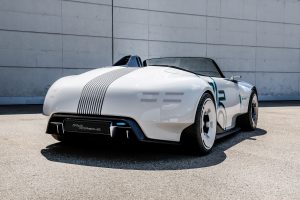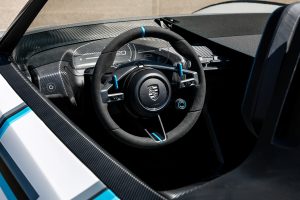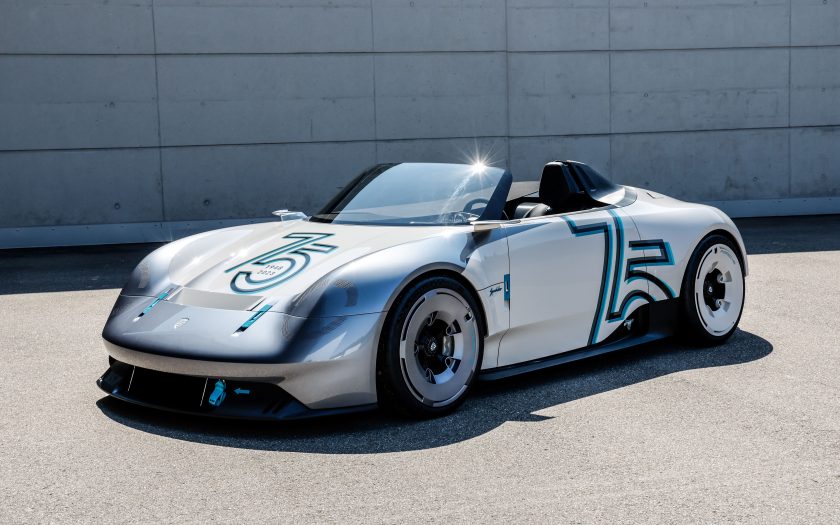PORSCHE MARKS THE 30TH ANNIVERSARY of the famed Goodwood Festival of Speed in style with the Porsche Vision 357 Speedster. The new concept car is the sister-model to the closed Porsche Vision 357 with which the sports car manufacturer launched its own anniversary-year celebrations. In design terms a homage to the 356, technologically the all-electric Porsche Vision 357 Speedster is based on the 718 GT4 e-Performance. Overall, Porsche presented more than 15 new and classic models on the grounds of the Duke of Richmond in West Sussex. One of the highlights is the 356 No. 1 Roadster, the very first sports car from the brand. Six Le Mans winners were also on display for the motorsport aficionados in attendance.
The Porsche Vision 357 is a nod to the first Porsche model line, Ferry Porsche’s dream sports car. And since the 356 has burned itself into the collective brand memory as both a convertible and a coupé, the same logic applies to the concept car: there can only be two,” says Michael Mauer, Vice President Style Porsche. “The Porsche Vision 357 Speedster embodies the essence of the brand. Driving pleasure and driving dynamics combined with an extremely purist form. As with the Mission X that we presented just a few weeks ago, this model demonstrates that even with fresh design genes, the Porsche DNA shines through.”
The Vision 357 Speedster is based on the technology of the Porsche 718 GT4 e-performance. So the electric motors and battery technology come from the Mission R and the chassis from the 718 GT4 Clubsport. Following its world premiere at the Goodwood Festival of Speed, the design study will be on display at this year’s Rennsport Reunion in the USA at the end of September.

Exterior design: shortened front windscreen and one-sided tonneau cover
The concept car has the squat, shortened windscreen that is typical of a speedster, lending even more emphasis to the car’s monolithic body. Spanning the right side of the car is a tonneau cover of the type once common on open-top sports cars. The driver’s headrest appears suspended in the air due to the technically designed carbon roll-over element behind it. Behind that is the charge port door and the anchor for the classic speedster top.
The two-colour concept with the two grey tones Marble Grey and Grivelo Grey Metallic is inspired by historic motorsport forerunners, such as the front fenders used to protect against flying rocks in race scenarios and the front wings, which feature the darker Metallic colour. The front wheels are also painted in Grivelo Grey Metallic. This is complemented by contrasts in Miami Blue, for example on the quick-release mechanisms on the wrap-around front bonnet.
The anniversary logo with the large “75” and the two years “1948” and “2023” feature Grivelo Grey Metallic and Miami Blue – a fresh alternative to the decorative elements of the coupé Vision 357, where red was used as an additional colour. Above this are comic-style unicorns in front of the rear wheels. The mythical creature was drawn specifically for the concept car by Porsche designers, who also put their hand to the punchy “Speedster” logo. Cameras replace the exterior mirrors. As in the classic forebears, they are not positioned on the doors, but further forward on the fenders. In the open-top 357, they feature a new, aerodynamically optimised shape reminiscent of wings.
Other details of the exterior design are familiar from its sister concept car: the four-point light signet on the front features a round design evocative of the Porsche 356. The rear lights sit behind a patterned array of points milled in the body itself. Another nod to the first Porsche model line is the vertical grille pattern in the rear. The third brake light is integrated in the grille design.
The wide track makes a bullish impression and enhances driving stability. The 20-inch wheels are made of magnesium and are equipped with carbon fibre hubcaps and central locks. Visually, they also recall a legendary Porsche wheel: the 356 A and 356 B with drum brakes had rims with the notably large bolt circle of 205 millimetres.

Interior design: purist, reduced cockpit
The interior is reduced to the essential and fully tailored to the driver. The low-slung seat position is quintessentially sporty. The carbon fibre-reinforced plastic seat shell is integrated in the monocoque. The driver sits on Racetex-covered pads and held firmly in place by a six-point seat belt with a Miami Blue belt strap. The instrument cluster sits atop the steering column as a transparent surface. The racing steering wheel exemplifies lightness, while the impact absorber appears as if suspended. The individual controls, meanwhile, revisit the accent colour Miami Blue from the exterior.
The entire dashboard is in a carbon-weave finish. As an alternative to a conventional glove compartment, Miami Blue straps in the upper right section can be used to secure accessories. Simple fabric straps replace conventional door handles. This detail from the racing milieu saves weight.
Parade of icons: other Porsche models at the Festival of Speed
The Vision 357 is the Porsche highlight at Goodwood, but it is far from the only rarity from the sports car manufacturer that will be on hand for the event. Porsche will be bringing more than 15 new and classic models to West Sussex. A special Porsche parade will ascend the famous hill twice daily at the Festival of Speed. The illustrious field will be led by the 356 No. 1 Roadster. It will be followed by the 928 “Trigema” race version from 1983, a Cayenne Transsyberia, a 959, a 911 Turbo S (type 993) and a very special 911 Carrera S (991). This one-off model was the one-millionth 911 manufactured since the advent of the iconic sports car in 1963.
Porsche will also be celebrating the 100th anniversary of the 24 Hours of Le Mans in Goodwood. After all, the brand holds the record of 19 overall victories. Porsche will also be showing three class champs and three overall winners, among others, in Goodwood. This includes the 718 W-RS Spyder (winner of the 2.0-litre class in 1961), the 935 Martini (class winner in 1976) and the 911 RSR in the “Pig” design (winner of the GTE Pro class in 2018). The trio of overall winners includes the 936/81 Spyder, the 911 GT1 ’98 and the 919 Hybrid from 2017.
After their premieres at the festivities marking “75 Years of Porsche Sports Cars”, the 718 Spyder RS and the Mission X will be presented to the wider public for the first time at Goodwood. The development of the purist roadster, the 718 Spyder RS, was dedicated to maximum driving pleasure on winding country roads. The Mission X concept car is the spectacular reinterpretation of a hypercar, with Le Mans-style doors that open up and forward, and a high-performance, efficient electric powertrain.
In addition to other current models from the Stuttgart-based sports car manufacturer, Goodwood visitors will also have the opportunity to see a Porsche “Junior 108” diesel tractor. After all, commissions for customer developments were an integral part of the company portfolio in the days when the Porsche 356 was in production. Between 1949 and July 1963, some 120,000 tractors were built under licence with the Porsche name.
